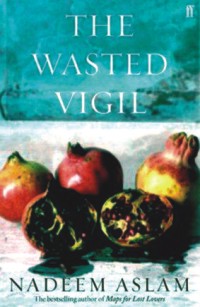Book Review
Anything to see those paper eyes
Adam Mars-jones
 The great champion of underwriting as a moral obligation was Hemingway and his influence carries on through Raymond Carver (substituting suburban desperation for virile stoicism). This American strain is particularly hardy, thanks to the great national discomfort with aestheticism, as if anyone who devotes large portions of a life to arranging words, or notes or lines or colours, could be anything but an aesthete. Cormac McCarthy is a particularly fascinating case, loving the plain but drawn despite himself to the fancy. His most apocalyptic book, The Road, had a strain of almost Yeatsian poetry, but Nadeem Aslam, dealing with situations hardly less extreme, goes much further. The great champion of underwriting as a moral obligation was Hemingway and his influence carries on through Raymond Carver (substituting suburban desperation for virile stoicism). This American strain is particularly hardy, thanks to the great national discomfort with aestheticism, as if anyone who devotes large portions of a life to arranging words, or notes or lines or colours, could be anything but an aesthete. Cormac McCarthy is a particularly fascinating case, loving the plain but drawn despite himself to the fancy. His most apocalyptic book, The Road, had a strain of almost Yeatsian poetry, but Nadeem Aslam, dealing with situations hardly less extreme, goes much further.
At least one writer (Lord Dunsany, was it?) has objected to his books being described as beautifully written, saying that this is no different from an architect being told that his buildings are made of beautiful bricks. The analogy is faulty, though: beauty in literature, like humour, isn't superficial, but something that wells up from the depths.
The drama slowly converges on a house that itself bears the scars of history, inside and out. Among the visitors are a local teacher who is being forced out of the job at least in part because of the lack of fanaticism in her faith, and a young jihadi pretending to be a labourer, blood kin of someone in the house, although no one but the reader knows this. There's a disused perfume factory on the premises, with a gigantic Buddha's head in the middle, tipped on its side, buried long ago and serenely surviving any efforts to dispose of it. Serenity isn't an available option elsewhere - you can't choose not to be a victim of history. You can, though, choose to trace its workings, the terrible calligraphy of events.
David, the American, can remember how shocked the Afghanis were when suicide bombing was proposed to them (by America) as a way of fighting the Russians. Every Muslim knew, then, that suicides went to hell. Marcus Caldwell, the elderly Englishman who owns the house and ran the perfume factory, remembers when the women of Kabul were independent and assured, only 20 years before the Taliban came. A group of students, learning that a particular car belonged to a visiting Pakistani poet, covered it with lipstick kisses. In those days, it was understood that a woman decides who deserves to be called a man.
Marcus has paid for his own freedoms. The best definition of irony is as a wound that gives pleasure. In terrible times - and Aslam specifies that in all recorded history there have been just 29 years without a war - beauty is only available in wounding forms. Under the Taliban regime, Marcus waits for his left hand to be cut off, in a small chamber at the back of the mosque. Years earlier, when this extension was being built, as a good citizen he gave jars of his best rose essence to be mixed in with the mortar. It's still fragrant.
The official mutilation is carried out as a medical procedure to prevent the subject from bleeding to death. Marcus's wife Qatrina is made to officiate, to sever the hand. It was she who had arranged for a woman to officiate at their wedding, on the basis that nothing in the Koran forbade it. Her marriage is now deemed a long adultery and she too will be punished.
The Wasted Vigil is much concerned with the silencing of women in fundamentalism. Under the Taliban, women still bought and wore earrings, but made sure that the ornaments made no noise. Survivors of the regime still tend to abstain from that secular tinkle. Nadeem Aslam sees the reasons for fundamentalist misogyny as pragmatic rather than doctrinal, the simplest way of giving vulnerable, uneducated recruits a sense of power.
In one of many upsetting scenes, a group of boy soldiers pours petrol on a frozen grave and hack at it with improvised tools. Desecration is not their purpose. The dead boy is one of their own, 'martyred' when he fell into a canyon on a training exercise. It's just that between them they have a single picture of a woman's face from a newspaper, which has been cut into 10 pieces for communal safe-keeping ('Travelling assorted distances, the fragments came together now and then to form her').
They haven't seen a woman for five years, are told continually that females personify temptation and sin, but some yearning survives. In a sentimental moment, they let a scrap showing one of the eyes be buried with the boy, who particularly loved them. But now they want it back. They are trying to exhume a paper eye. Even those most intent on the atomisation of women (and there is hardly a shortage) are bereaved by what they do.
This review was first published in the Guardian.
Copyright
(R) thedailystar.net 2009 |
